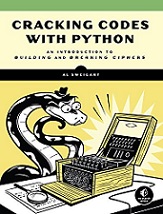
|
FreeComputerBooks.com
Links to Free Computer, Mathematics, Technical Books all over the World
|
|
- Title Cracking Codes with Python: An Introduction to Building and Breaking Ciphers
- Author(s) Albert Sweigart
- Publisher: No Starch Press (January 23, 2018)
- Hardcover/Paperback 416 pages
- eBook HTML
- Language: English
- ISBN-10: 1593278225
- ISBN-13: 978-1593278229
- Share This:

|
Learn how to program in Python while making and breaking ciphers—algorithms used to create and send secret messages!
After a crash course in Python programming basics, you’ll learn to make, test, and hack programs that encrypt text with classical ciphers like the transposition cipher and Vigenère cipher. You'll begin with simple programs for the reverse and Caesar ciphers and then work your way up to public key cryptography, the type of encryption used to secure today’s online transactions, including digital signatures, email, and Bitcoin.
Each program includes the full code and a line-by-line explanation of how things work. By the end of the book, you'll have learned how to code in Python and you’ll have the clever programs to prove it!
- Combine loops, variables, and flow control statements into real working programs
- Use dictionary files to instantly detect whether decrypted messages are valid English or gibberish
- Create test programs to make sure that your code encrypts and decrypts correctly
- Code (and hack!) a working example of the affine cipher, which uses modular arithmetic to encrypt a message
- Break ciphers with techniques such as brute-force and frequency analysis
- Albert Sweigart (but you can call him Al), is a software developer in San Francisco, California. He is originally from Houston, Texas. He laughs out loud when watching park squirrels, which makes people think he's a simpleton. His previous books are Hacking Secret Ciphers with Python, Invent Your Own Computer Games with Python and Making Games with Python and Pygame.

- Cracking Codes with Python: An Introduction to Building and Breaking Ciphers (Albert Sweigart)
- The Mirror Site (1) - PDF
- The Mirror Site (2) - PDF
-
 Open Workbook of Cryptology: Python Projects
Open Workbook of Cryptology: Python Projects
This book uses Python and some standard cryptographic libraries in Python to explore these cryptological ideas. It should be accessible to students with a solid basic comfort level with Python – but could also be used as a way to solidify Python.
-
 Hacking Secret Ciphers with Python (Albert Sweigart)
Hacking Secret Ciphers with Python (Albert Sweigart)
This book teaches you how to write your own cipher programs and also the hacking programs that can break the encrypted messages from these ciphers. It is a guide on the basics of both cryptography and the Python programming language.
-
 Python and Coding Theory (David Joyner)
Python and Coding Theory (David Joyner)
This is the lecture notes for a course on Python and coding theory designed for students who have little or no programmig experience. You will learn some of the Python computer programming language and selected topics in coding theory.
-
 Introduction to Modern Cryptography (Mihir Bellare, et al.)
Introduction to Modern Cryptography (Mihir Bellare, et al.)
This book introduces the core principles of modern cryptography, with an emphasis on formal definitions, clear assumptions, and rigorous proofs of security. It also presents design principles for widely used stream ciphers and block ciphers.
-
 Handbook of Applied Cryptography (Alfred J. Menezes, et al)
Handbook of Applied Cryptography (Alfred J. Menezes, et al)
This book is an incredible achievement. If you want to check what problems there were with a proposed system, determine how the variations on a particular algorithm developed, see what research preceded and followed an idea, go to the Handbook.
-
 The Joy of Cryptography (Mike Rosulek)
The Joy of Cryptography (Mike Rosulek)
The definitive introduction to all major areas of cryptography: message security, key negotiation, and key management, but in a way that is more accessible than what is "traditional" in crypto. All security definitions are written in a "game-based" style.
-
 Practical Cryptography for Developers (Svetlin Nakov)
Practical Cryptography for Developers (Svetlin Nakov)
A modern practical book about cryptography for developers with code examples, covering core concepts, along with crypto libraries and developer tools, with a lots of code examples in Python and other languages.
-
 A Graduate Course in Applied Cryptography (Dan Boneh, et al)
A Graduate Course in Applied Cryptography (Dan Boneh, et al)
This book is about mathematical modeling and proofs to show that a particular cryptosystem satisfies the security properties attributed to it: constructing practical cryptosystems for which we can argue security under plausible assumptions.
-
 Modern Cryptography Volume 1: A Classical Introduction
Modern Cryptography Volume 1: A Classical Introduction
This book systematically explores the statistical characteristics of cryptographic systems, the computational complexity theory of cryptographic algorithms and the mathematical principles behind various encryption and decryption algorithms.
-
 Modern Cryptography Volume 2: Post-Quantum Cryptography
Modern Cryptography Volume 2: Post-Quantum Cryptography
This open access book covers the most cutting-edge and hot research topics and fields of post-quantum cryptography. The main purpose of this book is to focus on the computational complexity theory of lattice ciphers.
-
 Fundamentals of Cryptology: A Professional Reference (H. Tilborg)
Fundamentals of Cryptology: A Professional Reference (H. Tilborg)
This is a thoroughly written wonderful book on cryptography! This excellent book is warmly recommended for mathematicians, computer scientists, for professors and students, and, as a reference book, for researchers in the area of cryptography.
-
 Cryptography: An Introduction, 3rd Edition (Nigel Smart)
Cryptography: An Introduction, 3rd Edition (Nigel Smart)
This book provides the rigorous detail required for advanced cryptographic studies, yet approaches the subject matter in an accessible style in order to gently guide new students through difficult mathematical topics.





